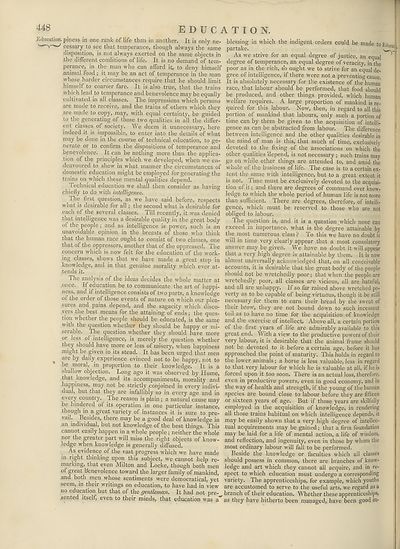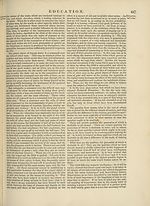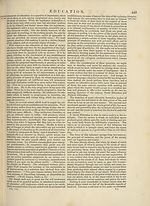Encyclopaedia Britannica > Volume 8, DIA-England
(458) Page 448
Download files
Complete book:
Individual page:
Thumbnail gallery: Grid view | List view

44S
EDUCATION.
Education, piness in one rank of life than in another. It is only ne-
cessary to see that temperance, though always the same
disposition, is not always exerted on the same objects in
the different conditions of life. It is no demand of tem¬
perance, in the man who can afford it, to deny himself
animal food; it may be an act of temperance in the man
whose harder circumstances require that he should limit
himself to coarser fare. It is also true, that the trains
which lead to temperance and benevolence may be equally
cultivated in all classes. The impressions which persons
are made to receive, and the trains of others which they
are made to copy, may, with equal certainty, be guided
to the generating of those two qualities in all the differ¬
ent classes of society. We deem it unnecessary, here
indeed it is impossible, to enter into the details of what
may be done in the course of technical education, to ge¬
nerate or to confirm the dispositions of temperance and
benevolence. It can be nothing more than the applica¬
tion of the principles which we developed, when we en¬
deavoured to show in what manner the circumstances of
domestic education might be employed for generating the
trains on which these mental qualities depend.
Technical education we shall then consider as having
chiefly to do with intelligence.
I he first question, as we have said before, respects
what is desirable for all; the second what is desirable for
each of the several classes. Till recently, it was denied
that intelligence was a desirable quality in the great body
of the people; and as intelligence is power, such is an
unavoidable opinion in the breasts of those who think
that the human race ought to consist of two classes, one
that of the oppressors, another that of the oppressed. The
concern which is now felt for the education1 of the work¬
ing classes, shows that we have made a great step in
knowledge, and in that genuine morality which ever at¬
tends it.
The analysis of the ideas decides the whole matter at
..once. If education be to communicate the art of happi¬
ness, and if intelligence consists of two parts, a knowledge
of the order of those events of nature on which our plea¬
sures and pains depend, and the sagacity which disco¬
vers the best means for the attaining of ends; the ques¬
tion whether the people should be educated, is the same
with the question whether they should be happy or mi¬
serable. The question whether they should have more
or less of intelligence, is merely the question whether
they should have more or less of misery, when happiness
might be given in its stead. It has been urged that men
are by daily experience evinced not to be happy, not to
be moral, in proportion to their knowledge. It is a
shallow objection. Long ago it was observed by Hume,
that knowledge, and its accompaniments, morality and
happiness, may not be strictly conjoined in every indivi¬
dual, but that they are infallibly so in every age and in
eveiy countiy. ^ I he reason is plain; a natural cause may
be hindered of its operation in one particular instance,
though in a great variety of instances it is sure to pre¬
vail. Besides, there may be a good deal of knowledge in
an individual, but not knowledge of the best things. This
cannot easily happen in a whole people; neither the whole
nor the greater part will miss the right objects of know¬
ledge when knowledge is generally diffused.
As evidence of the vast progress which we have made
in right thinking upon this subject, we cannot help re¬
marking, that even Milton and Locke, though both men
of great benevolence toward the larger family of mankind,
and both men whose sentiments were democratical, yet
seem, in their writings on education, to have had in view
no education but that of the gentleman. It had not pre¬
sented itself, even to their minds, that education was d?
blessing in which the indigent orders could be made to Fd
partake. 1 ^_,uca|
As we strive for an equal degree of justice, an equal '
degree of temperance, an equal degree of veracity, in the
poor as in the rich, so ought we to strive for an equal de¬
gree of intelligence, if there were not a preventing cause.
It is absolutely necessary for the existence of the human
race, that labour should be performed, that food should
be produced, and other things provided, which human
welfare requires. A large proportion of mankind is re¬
quired for this labour. Now, then, in regard to all this
portion of mankind that labours, only such a portion of
time can by them be given to the acquisition of intelli¬
gence as can be abstracted from labour. The difference
between intelligence and the other qualities desirable in
the mind of man is this, that much of time, exclusively
devoted to the fixing of the associations on which the
other qualities ‘depend, is not necessary; such trains may
go on while other things are attended to, and amid the
whole of the business of life. The case is to a certain ex¬
tent the same with intelligence, but to a great extent it
is not. Time must be exclusively devoted to the acquisi¬
tion of it; and there are degrees of command over know¬
ledge to which the whole period of human life is not more
than sufficient. There are degrees, therefore, of intelli¬
gence, which must be reserved to those who are not
obliged to labour.
I he question is, and it is a question which none can
exceed in importance, what is the degree attainable by
the most numerous class? To this we have no doubt it
will in time very clearly appear .that a most consolatory
answer may be given. We have no doubt it will appear
that a very high degree is attainable by them. It is now
almost universally acknowledged that, on all conceivable
accounts, it is desirable that the great body of the people
should not be wretchedly poor; that when the people are
wretchedly poor, all classes are vicious, all are hateful,
and all are unhappy. If so far raised above wretched po¬
verty as to be capable of being virtuous, though it be still
necessary for them to earn their bread by the sweat of
their brow, they are not bound down to such incessant
toil as to have no time for the acquisition of knowledge
and the exercise of intellect. Above all, a certain portion
of the first years of life are admirably available to this
great end. With a view to the productive powers of their
very labour, it is desirable that the animal frame should
not be devoted to it before a certain age, before it has
approached the point of maturity'. This holds in regard to
the lower animals; a horse is less valuable, less in regard
to that very labour for which he is valuable at all, if he is
forced upon it too soon. There is an actual loss, therefore,
even in productive powers, even in good economy, and in
the way of health and strength, if the young of the human
species are bound close to labour before they are fifteen
or sixteen years of age. But if those years are skilfully
employed in the acquisition of knowledge, in rendering
all those trains habitual on which intelligence depends, it
may be easily shown that a very high degree of intellec¬
tual acquirements may be gained; that a firm foundation
may be laid for a life of mental action, a life of wisdom,
and reflection, and ingenuity, even in those by whom the
most ordinary labour will fall to be performed.
Beside the knowledge or faculties which all classes
should possess in common, there are branches of know¬
ledge and art which they cannot all acquire, and in re¬
spect to which education must undergo a corresponding
variety. The apprenticeships, for example, which youths
are accustomed to serve to the useful arts, we regard as a
branch of their education. Whether these apprenticeships,
as they have hitherto been managed, have been good in-
EDUCATION.
Education, piness in one rank of life than in another. It is only ne-
cessary to see that temperance, though always the same
disposition, is not always exerted on the same objects in
the different conditions of life. It is no demand of tem¬
perance, in the man who can afford it, to deny himself
animal food; it may be an act of temperance in the man
whose harder circumstances require that he should limit
himself to coarser fare. It is also true, that the trains
which lead to temperance and benevolence may be equally
cultivated in all classes. The impressions which persons
are made to receive, and the trains of others which they
are made to copy, may, with equal certainty, be guided
to the generating of those two qualities in all the differ¬
ent classes of society. We deem it unnecessary, here
indeed it is impossible, to enter into the details of what
may be done in the course of technical education, to ge¬
nerate or to confirm the dispositions of temperance and
benevolence. It can be nothing more than the applica¬
tion of the principles which we developed, when we en¬
deavoured to show in what manner the circumstances of
domestic education might be employed for generating the
trains on which these mental qualities depend.
Technical education we shall then consider as having
chiefly to do with intelligence.
I he first question, as we have said before, respects
what is desirable for all; the second what is desirable for
each of the several classes. Till recently, it was denied
that intelligence was a desirable quality in the great body
of the people; and as intelligence is power, such is an
unavoidable opinion in the breasts of those who think
that the human race ought to consist of two classes, one
that of the oppressors, another that of the oppressed. The
concern which is now felt for the education1 of the work¬
ing classes, shows that we have made a great step in
knowledge, and in that genuine morality which ever at¬
tends it.
The analysis of the ideas decides the whole matter at
..once. If education be to communicate the art of happi¬
ness, and if intelligence consists of two parts, a knowledge
of the order of those events of nature on which our plea¬
sures and pains depend, and the sagacity which disco¬
vers the best means for the attaining of ends; the ques¬
tion whether the people should be educated, is the same
with the question whether they should be happy or mi¬
serable. The question whether they should have more
or less of intelligence, is merely the question whether
they should have more or less of misery, when happiness
might be given in its stead. It has been urged that men
are by daily experience evinced not to be happy, not to
be moral, in proportion to their knowledge. It is a
shallow objection. Long ago it was observed by Hume,
that knowledge, and its accompaniments, morality and
happiness, may not be strictly conjoined in every indivi¬
dual, but that they are infallibly so in every age and in
eveiy countiy. ^ I he reason is plain; a natural cause may
be hindered of its operation in one particular instance,
though in a great variety of instances it is sure to pre¬
vail. Besides, there may be a good deal of knowledge in
an individual, but not knowledge of the best things. This
cannot easily happen in a whole people; neither the whole
nor the greater part will miss the right objects of know¬
ledge when knowledge is generally diffused.
As evidence of the vast progress which we have made
in right thinking upon this subject, we cannot help re¬
marking, that even Milton and Locke, though both men
of great benevolence toward the larger family of mankind,
and both men whose sentiments were democratical, yet
seem, in their writings on education, to have had in view
no education but that of the gentleman. It had not pre¬
sented itself, even to their minds, that education was d?
blessing in which the indigent orders could be made to Fd
partake. 1 ^_,uca|
As we strive for an equal degree of justice, an equal '
degree of temperance, an equal degree of veracity, in the
poor as in the rich, so ought we to strive for an equal de¬
gree of intelligence, if there were not a preventing cause.
It is absolutely necessary for the existence of the human
race, that labour should be performed, that food should
be produced, and other things provided, which human
welfare requires. A large proportion of mankind is re¬
quired for this labour. Now, then, in regard to all this
portion of mankind that labours, only such a portion of
time can by them be given to the acquisition of intelli¬
gence as can be abstracted from labour. The difference
between intelligence and the other qualities desirable in
the mind of man is this, that much of time, exclusively
devoted to the fixing of the associations on which the
other qualities ‘depend, is not necessary; such trains may
go on while other things are attended to, and amid the
whole of the business of life. The case is to a certain ex¬
tent the same with intelligence, but to a great extent it
is not. Time must be exclusively devoted to the acquisi¬
tion of it; and there are degrees of command over know¬
ledge to which the whole period of human life is not more
than sufficient. There are degrees, therefore, of intelli¬
gence, which must be reserved to those who are not
obliged to labour.
I he question is, and it is a question which none can
exceed in importance, what is the degree attainable by
the most numerous class? To this we have no doubt it
will in time very clearly appear .that a most consolatory
answer may be given. We have no doubt it will appear
that a very high degree is attainable by them. It is now
almost universally acknowledged that, on all conceivable
accounts, it is desirable that the great body of the people
should not be wretchedly poor; that when the people are
wretchedly poor, all classes are vicious, all are hateful,
and all are unhappy. If so far raised above wretched po¬
verty as to be capable of being virtuous, though it be still
necessary for them to earn their bread by the sweat of
their brow, they are not bound down to such incessant
toil as to have no time for the acquisition of knowledge
and the exercise of intellect. Above all, a certain portion
of the first years of life are admirably available to this
great end. With a view to the productive powers of their
very labour, it is desirable that the animal frame should
not be devoted to it before a certain age, before it has
approached the point of maturity'. This holds in regard to
the lower animals; a horse is less valuable, less in regard
to that very labour for which he is valuable at all, if he is
forced upon it too soon. There is an actual loss, therefore,
even in productive powers, even in good economy, and in
the way of health and strength, if the young of the human
species are bound close to labour before they are fifteen
or sixteen years of age. But if those years are skilfully
employed in the acquisition of knowledge, in rendering
all those trains habitual on which intelligence depends, it
may be easily shown that a very high degree of intellec¬
tual acquirements may be gained; that a firm foundation
may be laid for a life of mental action, a life of wisdom,
and reflection, and ingenuity, even in those by whom the
most ordinary labour will fall to be performed.
Beside the knowledge or faculties which all classes
should possess in common, there are branches of know¬
ledge and art which they cannot all acquire, and in re¬
spect to which education must undergo a corresponding
variety. The apprenticeships, for example, which youths
are accustomed to serve to the useful arts, we regard as a
branch of their education. Whether these apprenticeships,
as they have hitherto been managed, have been good in-
Set display mode to:
![]() Universal Viewer |
Universal Viewer | ![]() Mirador |
Large image | Transcription
Mirador |
Large image | Transcription
Images and transcriptions on this page, including medium image downloads, may be used under the Creative Commons Attribution 4.0 International Licence unless otherwise stated. ![]()
| Encyclopaedia Britannica > Encyclopaedia Britannica > Volume 8, DIA-England > (458) Page 448 |
|---|
| Permanent URL | https://digital.nls.uk/193328959 |
|---|
| Attribution and copyright: |
|
|---|
| Description | Ten editions of 'Encyclopaedia Britannica', issued from 1768-1903, in 231 volumes. Originally issued in 100 weekly parts (3 volumes) between 1768 and 1771 by publishers: Colin Macfarquhar and Andrew Bell (Edinburgh); editor: William Smellie: engraver: Andrew Bell. Expanded editions in the 19th century featured more volumes and contributions from leading experts in their fields. Managed and published in Edinburgh up to the 9th edition (25 volumes, from 1875-1889); the 10th edition (1902-1903) re-issued the 9th edition, with 11 supplementary volumes. |
|---|---|
| Additional NLS resources: |
|

